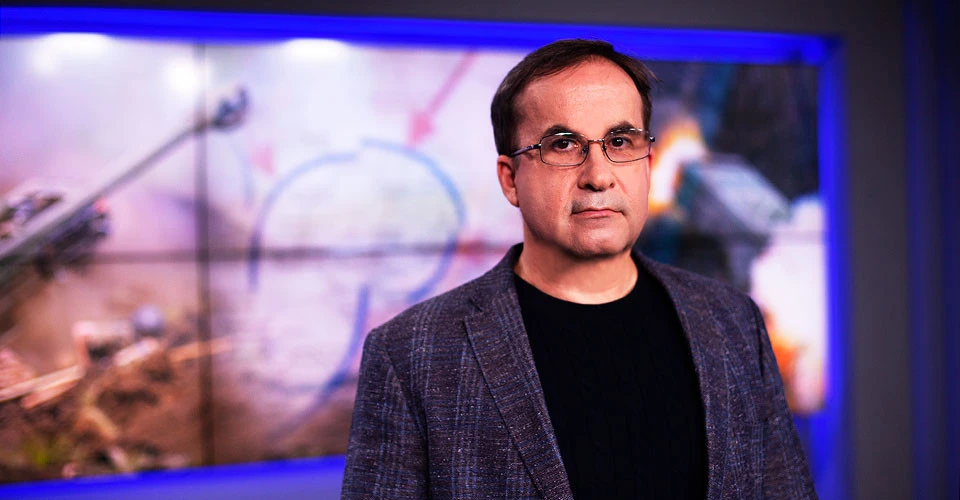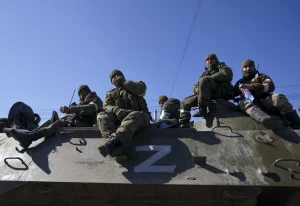
Ukraine advances near Velyka Novosilka, Russia lacks strategy in Syria. Serhiy Zgurets' column
Ukrainian Defense Forces successfully drove Russian troops out of the village of Novyi Komar in the Vremivka sector of the Donetsk region. Novyi Komar is situated just 5 kilometers from Velyka Novosilka, a settlement that Russia persistently seeks to encircle and cut off from the Defense Forces' logistical support
Ukrainian Armed Forces liberate Novyi Komar village in Vremivka sector of Donetsk region
After Ukrainian troops cleared the right bank of the Oskil River near Novomlynsk in the Kupyansk sector, the Ukrainian Defense Forces continue to advance in other areas of the frontline. Recently, the spokesman for the Khortytsia Brigade confirmed that the Ukrainian military drove the Russian forces out of the village of Novyi Komar in the Vremivka sector of Donetsk region, 5 km from Velyka Novosilka, which Russia is constantly trying to entrap and cut off the logistics of the Ukrainian Defense Forces. Three roads lead to Velyka Novosilka. One is operational from Novosilka to Velyka Novosilka, one is captured by Russian forces, and the third passes near the village of Novyi Komar.

Map of the hostilities around Velyka Novosilka as of December 5
In Novyi Komar, changes began in Ukraine's favor. Russian troops were driven out of there. This was done by the soldiers of Ukraine's 48th separate assault battalion. They reported that they were clearing the Russian remnants in Novyi Komar. In reality, it was a team effort. Alongside the 48th Separate Assault Battalion, units from the 51st Separate Mechanized Brigade, tank crews from the 23rd Separate Mechanized Brigade, and drone operators played crucial roles. Notably, the operators from the Vyrii company of unmanned attack drones in the 241st Brigade of the Territorial Defense Forces performed exceptionally well. This is undoubtedly positive news, but it is understood that the Russians will likely regroup and launch renewed assaults on Velyka Novosilka. The most dangerous direction remains the northeast. In particular, between the Kashlahach and Shaitanka rivers, where Russian forces took the road to the east of the settlement. Thus, it is clear that the fighting around Velyka Novosilka will persist, as this settlement holds significant strategic importance for the Russians, and both sides recognize this. In addition to pushing the Russians out of Novyi Komar, the Skala assault battalion conducted similar operations in Rozdolne, which has been under Russian control for some time. This suggests that the military command has bolstered Ukrainian units with assault battalions to significantly hinder the Russian advance toward Velyka Novosilka.
Ukrainian Armed Forces keep holding a bridgehead in Kursk region
In Russia's Kursk region, the Ukrainian military is holding a foothold that has shrunk to 600 square kilometers. Russian troops have concentrated more than 50,000 troops on this section of the frontline. In particular, marines, airborne troops, and North Korean military units. Fighting in the Kursk region continues in several directions along the entire perimeter of the front. First of all, Russian troops are attacking near Darin, but without success. Advancement of Ukrainian troops to the west of Mala Loknia was also recorded. Mala Loknia and Sverdlikovo are very important settlements that cover the Russian advance to Sudzha. The Russians are trying to advance to the roads secured by the Ukrainian troops by attacking Darino, Plekhovo and Zeleny Shlyakh. The question arises as to how long Ukrainian troops will be able to hold this particular section of the frontline.

Map of hostilities in the Kursk region as of December 5
However, we understand that this issue has already become political. A few days ago, Volodymyr Zelenskyy said that Putin wants Ukrainian troops to be pushed out of the Kursk region before Trump's inauguration. It is important for Putin to demonstrate that he is in control of the situation, but he is not. Therefore, we can conclude that the Ukrainian military will hold this foothold until January 20, and possibly even longer. It is worth recalling the interview with the former Chief of the General Staff Viktor Muzhenko, who said that today there should be no talk of the Ukrainian Armed Forces leaving the Kursk region at all. After all, we need to hold certain lines. Russia has accumulated certain forces, and Ukraine has the ability to conduct mobile defense in Russian territory. Otherwise, Russia will transfer these resources to the territory of Ukraine.
Europe intends to change the war course in Ukraine's favor
Analyst at the National Institute for Strategic Studies, Oleksiy Yizhak, said that the position of European countries on the war in Ukraine is reflected in political communiqués. In particular, the communiqué of the NATO ministerial meeting explains that European countries should provide assistance to Ukraine on a scale that would change the course of the war once and for all. In other words, Europe clearly realizes that it is important to change the course of the war in favor of Ukraine, not just to change the fighting in a particular section of the front. According to Yizhak, this position has become the main European trend today. The resources for such actions are believed to be more than enough.
As for the U.S. position, the situation in the American perception of the war in Ukraine is a bit more complicated. This is because the presidential administration is changing. According to Yizhak, there are three plans of the new administration regarding the war in Ukraine. In particular, they only talk about freezing the war. As for the statements of the current Biden administration, they emphasize that Ukraine has received enough weapons, and now Kyiv must step up mobilization. This position, according to Yizhak, is distorted in relation to what is happening in Ukraine.
Oleksiy Yizhak believes that the main topic of the conversation between the head of the Russian General Staff, Valery Gerasimov, and the chairman of the U.S. Joint Chiefs of Staff, Charles Brown, was Syria. In particular, the events that are taking place in Syria, or rather how Russia is responding to them. Russia has withdrawn its own warships from the Tartus base and is firing Zircon missiles at the rebels. The mere firing of Zircon missiles, which are imperfect and much worse than Iskander missiles, cannot change much.
Accordingly, as Yizhak noted, this looks like a continuation of a story similar to the launch of the Oreshnik missile. In particular, Russia continues to intimidate with nuclear weapons. As part of the intimidation, the Russians began to say that the Zircon missiles are equivalent to nuclear weapons. According to Yizhak, this is another sign that Putin's entourage is trying to calm him down with another weapon to intimidate the world. Therefore, the conversation between Gerasimov and Brown should be viewed in this context. Russia is once again using their old trick of intimidation with weapons “unparalleled in the world” to try to stabilize the situation in Syria.
There is no alternative to joining NATO for Ukraine
Oleksiy Yizhak believes that the statement of the Ukrainian Foreign Ministry that there is no alternative to NATO as a guarantee of Ukraine's security is quite correct. The analyst noted that such statements do not narrow the possibilities for future negotiations. After all, any security guarantees, except for NATO membership, cannot guarantee a repeat of Russian aggression. This is an indication of the level that will be sufficient for Ukraine. However, according to Yizhak, this position does not exclude other options that may be considered for Ukraine in future negotiations with Russia. Ukraine will always advance and do everything possible to join the Alliance. Even if Kyiv receives less security guarantees than it expected.
Oleksiy Yizhak noted that Russia continues to demand Ukraine’s complete capitulation from the U.S. and the West. This suggests that Russia rejects any plan for freezing the war proposed by Donald Trump. The Russians continue to insist on demilitarization, a change of political leadership, and a shift in political course. In the U.S., Donald Trump's representatives do not talk about peace but focus on freezing the war, with discussions about territorial issues and Ukraine's internal and foreign policies postponed until after Putin’s death. Trump himself has remained silent on the war in Ukraine for a long time, understanding that there will only be one opportunity to end the war, and it must be a swift conclusion. For this reason, Yizhak believes that Trump is carefully considering which plan for ending the war to choose.
- News











































